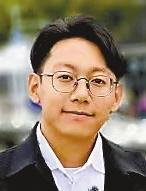Shenzhen
 2024/3/5
2024/3/5
 source: Shenzhen Daily
source: Shenzhen Daily
 Print
Print

Shin Moon-sub
Debra Li
debra_lidan@163.com
HAVING started playing the piano at the tender age of 4 and voice training at 11, Shin Moon-sub, a doctoral candidate at Shenzhen University, has always found a wellspring of joy in music.
Oppa Shin, a nickname his friends use meaning “older brother” in Korean, once seriously thought about pursuing music as a career in junior high. He had won awards at piano competitions and was admitted into a prestigious chorus in Haeundae District, Busan. However, he set aside his musical aspirations for more practical choices after his family moved from Busan to Seoul.
The South Korean lad didn’t anticipate that destiny had a great surprise for him when he moved with his family to Shenzhen in 2010, where he would rekindle his deep-rooted passion for music and singing.
Then a sophomore student of bioengineering at Konkuk University in Seoul, Shin decided to go with his father, an expert contracted to work at the Daya Bay Nuclear Power Station in Shenzhen, and spend a year learning the Chinese language.
That planned gap year has turned into a lengthy love affair with the Chinese language and culture in this coastal city, as Shin, after more than a decade, is still pursuing his studies and passion for music here.
In 2014, Shin became part of the first batch of roughly 30 expats to graduate with a bachelor’s degree in Chinese language and literature from Shenzhen University’s College of International Exchange. He then went on to earn a master’s degree and pursue a doctorate in the comparative study of law systems in China and South Korea, encouraged by his tutor Huang Yaying and aided by a scholarship from the university.
Discussing his efforts to establish the International Choir of Shenzhen University (SZUIC), Shin said his dream wouldn’t have come true had it not been for support from his university.
“In March 2016, a group of visiting Yale students performed a cappella singing in our campus hall,” Shin recalled. “I couldn’t get their beautiful voices out of my head and started itching for a chorus where I could practice with my schoolmates.” SZUIC officially launched in the fall semester of 2016 with help from the school.
Before the COVID pandemic, the chorus gave many performances on campus and at local festivals, singing covers of beloved English and Chinese pop songs like “You Raise Me Up” and “Ju Hua Tai” (“Chrysanthemum Flower Bed”).
Zhang Haomiao, Shin’s friend and a member of SZUIC, rewrote the lyrics of “I Like” by the Rainbow Chamber Singers, turning it into “I Like Shenzhen University,” which swiftly captured the hearts of students.
Because the chorus couldn’t do in-person performances during the pandemic, Shin tried to write original songs for the chorus in order to “avoid possible IP infringement and make a unique presence online.” Thus far, Shin has composed five original songs that include lyrics written by himself and fellow chorus members.
To compose a song, Shin would “play the tunes on the piano or hum the melodies line after line,” then revise them over and over again until “everything fell into place.”
During the pandemic, Shin also founded the StudyinChina Cloud Choir, with support from China’s Ministry of Education, after winning a short video competition organized by the ministry.





